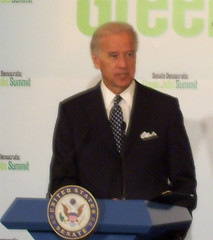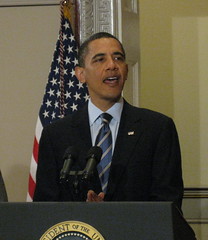Wednesday
Jun242009
Chilean President Touts Chile’s Successful Economic Policies
By Celia Canon - Talk Radio News Service
During an address on Latin America and the economic crisis at the Brookings Institute yesterday, Chilean President Michelle Bachelet discussed her country's comparatively strong economy, explaining that the 1980’s economic crisis in Latin America taught the region to take measures to insulate itself from global financial crises.
“This time in Latin America, fundamental [institutions] were better and policy responses were swift,” Bachelet said. "Central banks move quickly to offset the lack of liquidity in dollars using either sovereign funds or international reserves accumulated during the commodity boom earlier this decade.”
Chile's current financial stability is largely due to the fact that it has moved away from American policies in recent years, eschewing the Washington Consensus, a set of American recommendations to Latin American states on how to rebuild their economies in 1989. The recommendations focused on maintaining a free market economy with little to no government involvement.
“This approach of no regulation is an approach that we have come to call in Chile the 'Paradigm of Passivity,' " Bachelet said. "The crisis has taught us what we should have known all along: that the state is not and cannot be passive when it comes to economic activity or financial regulation."
The Chilean president added: “When I talk about not being passive, I’m not talking necessarily about [an] interventionist state. I’m not calling for a government involved in all sectors of the economy or prone to over-regulating markets.”
Bachelet also compared Western states and Chile with regard to the policies implemented to reduce the impact of the global financial crisis.
“Unlike the U.S. and much of Europe, in 2009, tax payers have not have to pay the burden of bailing out” national companies, said Bachelet.
Additionally, the Chilean government has produced its own stimulus package, which aims to maintain the population’s purchasing power, rather than bail out industries.
“This [stimulus] package was designed to inject resources directly into the pockets of the most deprived families to promote employment by increasing public investment, and by granting subsidies to youth employment and to encourage private investment with temporary tax rebates,” Bachelet said.
Bachelet, a moderate socialist, is currently in Washington, D.C. to meet with President Barack Obama in hopes of increasing bilateral ties and improving trade partnerships. During her speech, she was quick to empathize with the Americans, echoing Obama's frequent calls for an economic restructuring to lead to “lasting prosperity."
States should not “go back to the same situation that we were in before, because that would mean we haven't learned the lessons of the crisis,” Bachelet said.
During an address on Latin America and the economic crisis at the Brookings Institute yesterday, Chilean President Michelle Bachelet discussed her country's comparatively strong economy, explaining that the 1980’s economic crisis in Latin America taught the region to take measures to insulate itself from global financial crises.
“This time in Latin America, fundamental [institutions] were better and policy responses were swift,” Bachelet said. "Central banks move quickly to offset the lack of liquidity in dollars using either sovereign funds or international reserves accumulated during the commodity boom earlier this decade.”
Chile's current financial stability is largely due to the fact that it has moved away from American policies in recent years, eschewing the Washington Consensus, a set of American recommendations to Latin American states on how to rebuild their economies in 1989. The recommendations focused on maintaining a free market economy with little to no government involvement.
“This approach of no regulation is an approach that we have come to call in Chile the 'Paradigm of Passivity,' " Bachelet said. "The crisis has taught us what we should have known all along: that the state is not and cannot be passive when it comes to economic activity or financial regulation."
The Chilean president added: “When I talk about not being passive, I’m not talking necessarily about [an] interventionist state. I’m not calling for a government involved in all sectors of the economy or prone to over-regulating markets.”
Bachelet also compared Western states and Chile with regard to the policies implemented to reduce the impact of the global financial crisis.
“Unlike the U.S. and much of Europe, in 2009, tax payers have not have to pay the burden of bailing out” national companies, said Bachelet.
Additionally, the Chilean government has produced its own stimulus package, which aims to maintain the population’s purchasing power, rather than bail out industries.
“This [stimulus] package was designed to inject resources directly into the pockets of the most deprived families to promote employment by increasing public investment, and by granting subsidies to youth employment and to encourage private investment with temporary tax rebates,” Bachelet said.
Bachelet, a moderate socialist, is currently in Washington, D.C. to meet with President Barack Obama in hopes of increasing bilateral ties and improving trade partnerships. During her speech, she was quick to empathize with the Americans, echoing Obama's frequent calls for an economic restructuring to lead to “lasting prosperity."
States should not “go back to the same situation that we were in before, because that would mean we haven't learned the lessons of the crisis,” Bachelet said.
tagged  1980's economic crisis,
1980's economic crisis,  Brookings Institution,
Brookings Institution,  Employment,
Employment,  FDI,
FDI,  Latin America,
Latin America,  Michelle Bachelet,
Michelle Bachelet,  President Barack Obama,
President Barack Obama,  Washington Consensus,
Washington Consensus,  bail out,
bail out,  bilateral,
bilateral,  central banks,
central banks,  chile,
chile,  commodity boom,
commodity boom,  europe,
europe,  foreign direct investment,
foreign direct investment,  global financial crisis,
global financial crisis,  interventionism,
interventionism,  lasting prosperity,
lasting prosperity,  national companies,
national companies,  paradigm of passivity,
paradigm of passivity,  private investment,
private investment,  public investment,
public investment,  regulatory reform,
regulatory reform,  socialist,
socialist,  stimulus package,
stimulus package,  subsidies,
subsidies,  tax rebates,
tax rebates,  trade partnership in
trade partnership in  News/Commentary
News/Commentary
 1980's economic crisis,
1980's economic crisis,  Brookings Institution,
Brookings Institution,  Employment,
Employment,  FDI,
FDI,  Latin America,
Latin America,  Michelle Bachelet,
Michelle Bachelet,  President Barack Obama,
President Barack Obama,  Washington Consensus,
Washington Consensus,  bail out,
bail out,  bilateral,
bilateral,  central banks,
central banks,  chile,
chile,  commodity boom,
commodity boom,  europe,
europe,  foreign direct investment,
foreign direct investment,  global financial crisis,
global financial crisis,  interventionism,
interventionism,  lasting prosperity,
lasting prosperity,  national companies,
national companies,  paradigm of passivity,
paradigm of passivity,  private investment,
private investment,  public investment,
public investment,  regulatory reform,
regulatory reform,  socialist,
socialist,  stimulus package,
stimulus package,  subsidies,
subsidies,  tax rebates,
tax rebates,  trade partnership in
trade partnership in  News/Commentary
News/Commentary 





Transportation Industry Benefitting From Stimulus
The American Recovery and Reinvestment Act of 2009 has been successful in providing and saving jobs in the transportation sector, Senate Majority Whip Dick Durbin (D-Ill.) said Wednesday. He also pointed out that we are only four months into a two year recovery plan, so most results aren't yet perceptible.
Durbin says the government has provided checks for $60.4 billion and has allocated $234 billion of the total $787 billion stimulus package. Ed Wytkind, president of the Transportation Trades Department of the AFL-CIO, said that an historic $48 billion of the stimulus will be spent on transportation.
“I wish the recession would end tomorrow but we have to be patient...for those who say ‘accelerate payments,’ I have the same basic feeling myself. But I just know from human and government experience that haste does make waste. Let’s make sure these funds are well invested and well spent,” said Durbin.
Wytkind discussed the multiplier effect that occurs when the transportation industry spends money that simultaneously benefits other sectors of the economy, such as the steel and lumber industries.
Wytkind criticized former President George W. Bush’s administration for neglecting to use the transportation industry as a mode for job creation. “The fact is that Americans are hurting, our members are hurting, because of eight years of do-nothing economic policies. [President Obama and the new Congress] are wedded to turning around an economy that is reeling,” said Wytkind.